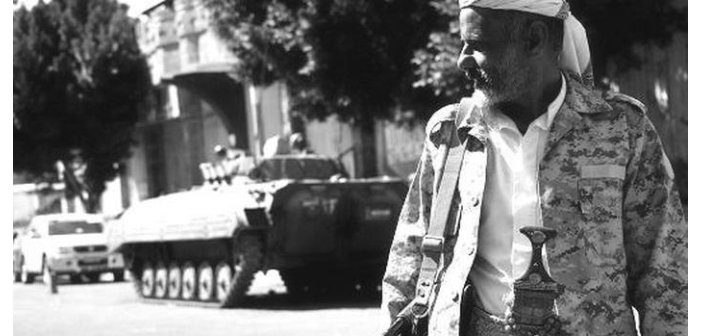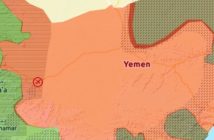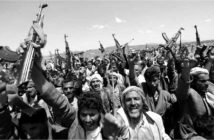Things in Yemen have become more difficult. People are struggling with shortages of fuels, water, while electricity has almost ceased. Every two or three days, people get some thirty minutes of electricity. In the capital Sana’a, there are only four Internet coffee shops still working. Civilians are struggling to get a place in one of them to communicate, waitingfor hours to get a computer. There are still two daily newspapers and three weekly ones out of dozens that were closed by the Houthis or due to the shortage of fuel and electricity. Just a handful of journalists were selected to operate in the Yemeni official media outlets… Would Yemenis need to learn from the past?
The Saudi military intervention in Yemen may be argued as necessary for political transition in 2015 as the Egyptian’s was in the 1960s. Egyptian support was vitally important to bringing about the needed political change Yemenis were desperately seeking. Yet Egyptian involvement in the Yemeni conflict came at a high cost for Yemenis and Egyptians.
The Saudi-led military action in Yemen has foiled Saleh-Houthi’s coup d’état against the political transition process, but it has failed to put down the rebellion so far, let alone to reinstate the legitimate Yemeni president and government.
Meanwhile one can argue that the Saudis’ stated objective has been practically realized. The operation has managed to prevent Iran from gaining footholds in Yemen presently, nevertheless that there is still much work need to be done.
For the Yemenis the operation still has a long way to go to achieve its desirable end. The legitimate government led by president Hadi, though strongly backed locally, regionally and internationally has been unable to operate on the Yemeni territories. Though the aerial strikes have significantly undermined Saleh-Houthi’s military capacities and arsenal, their militias are still in control on the ground, equipped with enough weapons and ammunition to keep on fighting for several months ahead.
Interestingly, the ex-president Saleh has finally come to understand that is already politically finished. He announced publically on the first day of the operation that neither he nor his son or any one of his relatives would seek to contest any presidential election. He has really realized that the Saudis, who view the alliance with the Houthis as a coalition with Iran, won’t tolerate his uncalculated adventure this time.
However, Saleis unlikely to give in easily. Indeed, he made clear that he is resolved to fight until the end. “We are going to fight until the last Yemeni citizen”, he said in a televised interview in May. Unfortunately, he has enough military and financial resources to act as a warlord. He is set to go on fighting at least in the hope of securing immunity from prosecution once again.
Meanwhile, Houthis are fighting for survival and maintaining the political gains they have achieved since September 2011.They are willing to fight the wrong and lost battles, regardless of the huge sacrifices they have to make in blood and no matter the devastating consequences of the war.
Against this background, Yemenis have more difficult months ahead. The legitimate government has turned out to be powerless. It will take a long time to establish effective armed and security forces that can act aggressively against the rebels so as to force them to come to a reasonable compromise. The popular armed resistance against Saleh-Houthi’s militias can’t make significant progress so far. It is still ill organized and inadequately armed. Moreover, the legitimate leadership seems to be understandably reluctant about arming the popular resistance fearing to fuel endless civil war.
Security Concerns
The ongoing internal fighting and the Saudi-led military operation have created ideal conditions for the terrorist and extremist religious organizations to operate. Al-Qaeda in the Arabian Peninsula and the IS have been recruiting easily and gaining ground on a daily basis. The Houthis used to label their opponents as Al-Qaeda and IS militants. Al-Qaeda capitalized on the Houthis’ propaganda to depict itself as the protector of the Sunnis. Realizing the danger of the current situation the regional and international experts on terrorism warned repeatedly of the serious consequences of the civil war in Yemen.
Humanitarian Concerns
The current political dilemma will soon turn into a humanitarian crisis. The international relief agencies have announced frequently that the nation is at the brink of a humanitarian catastrophe. The main basic service networks, electricity and water, have already ceased to operate, while health and telecommunication are struggling to keep on.
The Trade Chamber officials in the capital Sana’a launched an appeal for an urgent financial rescue program totaling not less than $3 billion to bail out the national economy as soon as possible. The private sector reported to have estimated its losses at more than $15 billion within the past three months due to the blockade imposed on Yemen by the Saudi-led coalition.
Who Can Help Yemen?
It is well known that the conflict in Yemen has something to do with the regional rivalry between Saudi Arabia and Iran. When the Houthiscame to the capital Sana’a in September 2011, president Hadi claimed that Houthis’ move was backed by Iran, “Iran would like to swap Sana’a with Damascus”, he told a large audience in the capital. More to the point, the leader of Hezbollah, Hassan Nasser Allah, gave more speeches about the Saudi-led military operation in Yemen than the leader of the Houthis did. Once the Houthis took over Sana’a in autumn of last year, the commander of the Iranian Revolutionary Guards boasted that one more Arab capital came under Iran’s influence.
However, Iran’s response to the Saudi-led war on Yemen was quite pragmatic. It condemned the war, describing it as illegal aggression, showed sympathy with Yemeni people and offered humanitarian aid. Most importantly in the early days of the aerial offensive the Iranian officials suggested dialogue and proposed an initiative to solve the Yemeni crisis. Many Yemenis who align themselves with the Houthis have been disappointed by the Iranian’s reaction. They wrongly expected Iran’s response would be as firm and strong as it was to the campaign against Syria.
The fact is that Iran’s support to the Houthis is overestimated by Saudis and their allies. It is known that Iran’s interest in Yemen is very limited compared with Syria and Lebanon.Thereby, a deal can be brokered under which Saudis and their allies stop supporting armed opposition in Syria for Iranian assistance in reaching an agreement in Yemen between the Houthis and the government. Perhaps, Iranian-Russian mediation may be helpful.
The UN envoy Ismail Weld el-Sheikh has already paid a visit to Iran and a Houthi delegation visited Moscow recently. In the same vein, Oman has already embarked on mediation and it is qualified to undertake such mission. Talks between a Houthi delegation and American officials were also held in Muscat.
History Lesson
Yemenis need to take the lessons from history so as not to repeat the mistakes of the past. The Egyptian military intervention in Yemen in 1960s should provide a good lesson to the Yemeni leaders and people alike today. In 1962 Egyptian support was necessary to maintain the 26 September revolution. However, Egyptian involvement caused Yemenis five years of civil war. At the end, Yemenis had to sit down together to discuss how to find a reasonable solution. It is still possible to reach an agreement that can save the face of each party.
It is well known that in the 1960s the revolutionaries were backed by Egypt, and the royalists by Saudi Arabia, who then fought each other for five years. Yet no party could eliminate or defeat the other forever. The Saudi-led intervention might be essential to bring Yemen back to the path of political transition, but it should not trigger several years of civil war.
Yemenis today need not to go for a dialogue once again. They just need to go on implementing the National Dialogue Conference’s outcomes and nothing else.





1 Comment
A lire aussi pour celles et ceux que le sujet intéresse ! L’article est en français.
http://orientxxi.info/magazine/les-contradictions-de-la-question-yemenite,0952